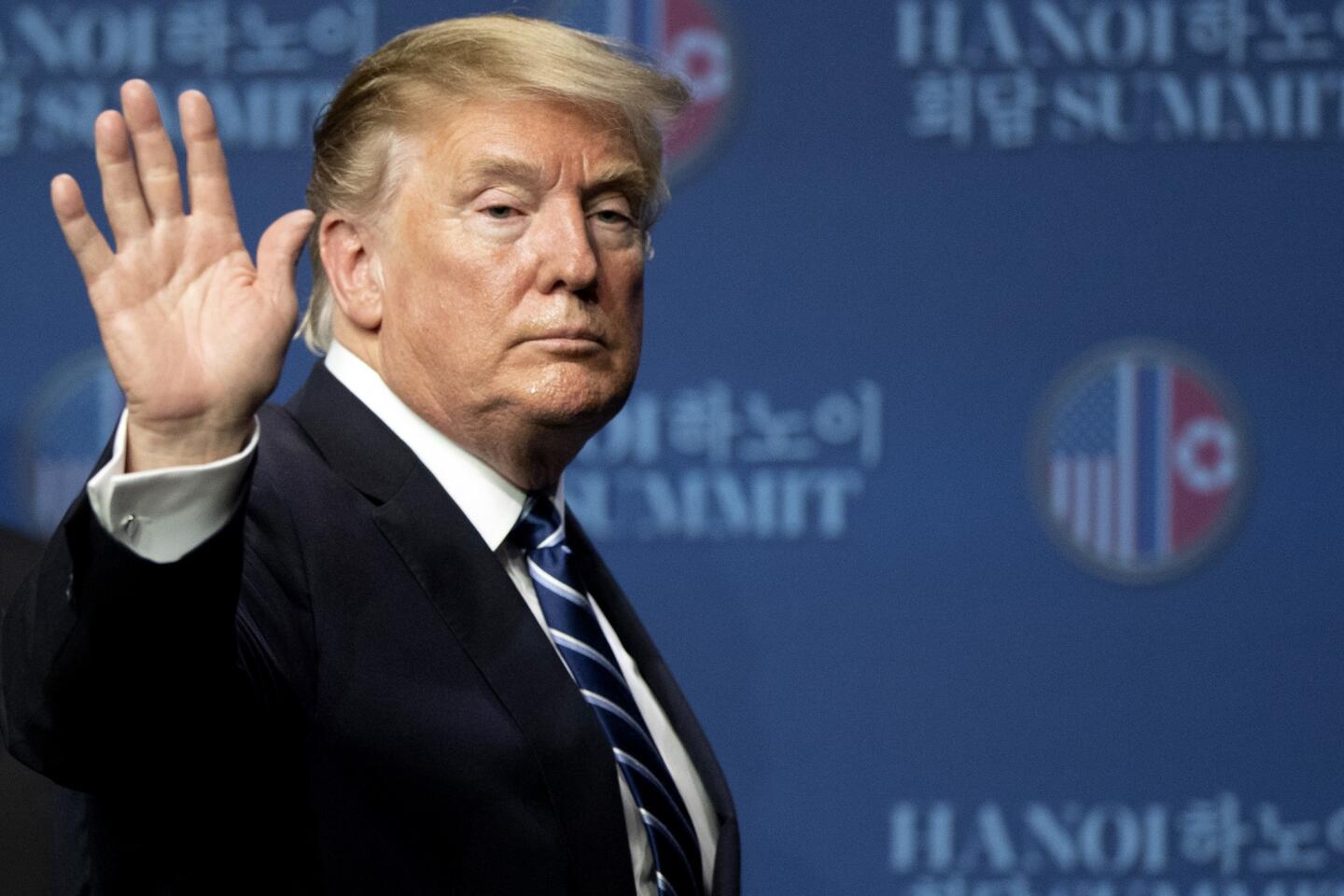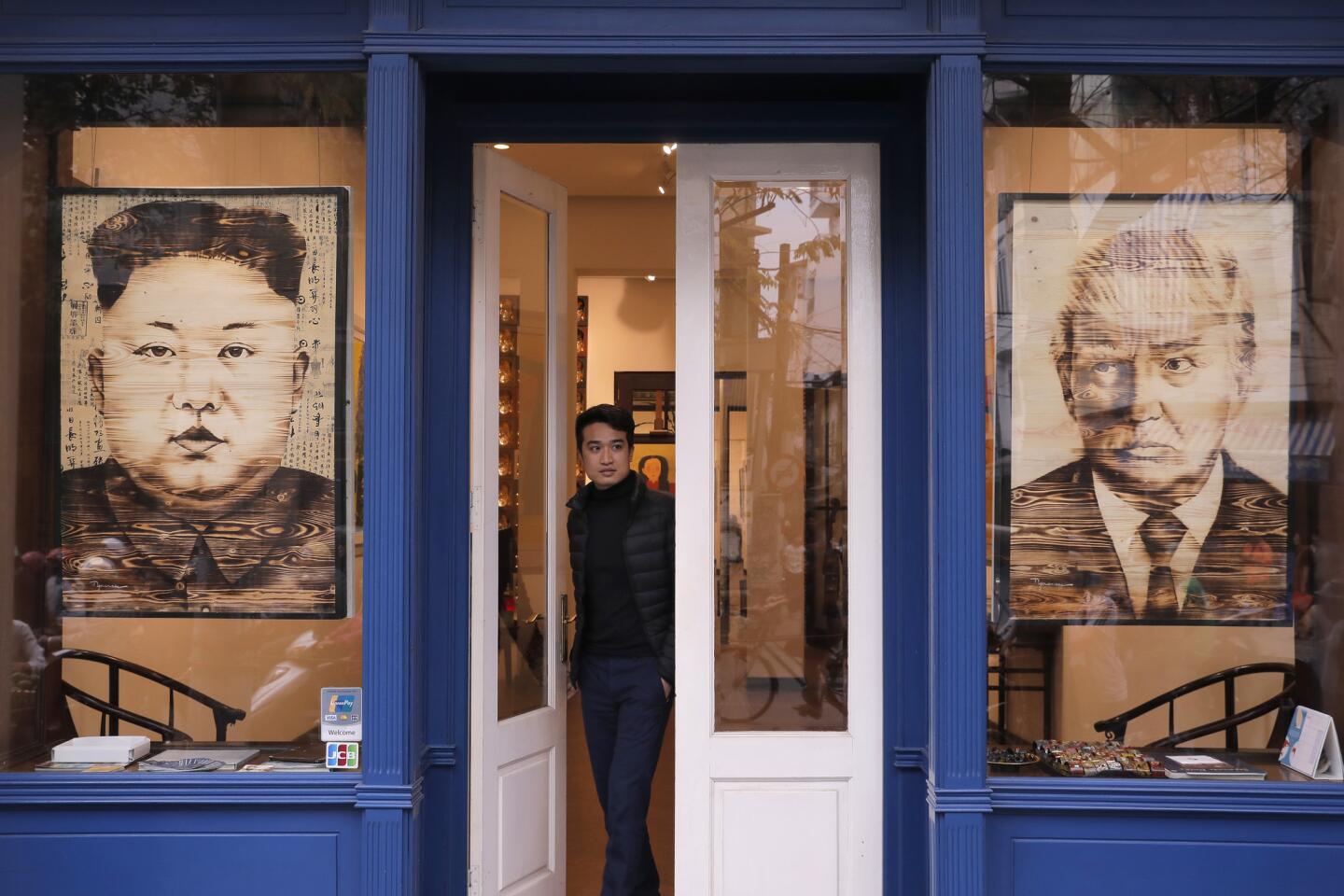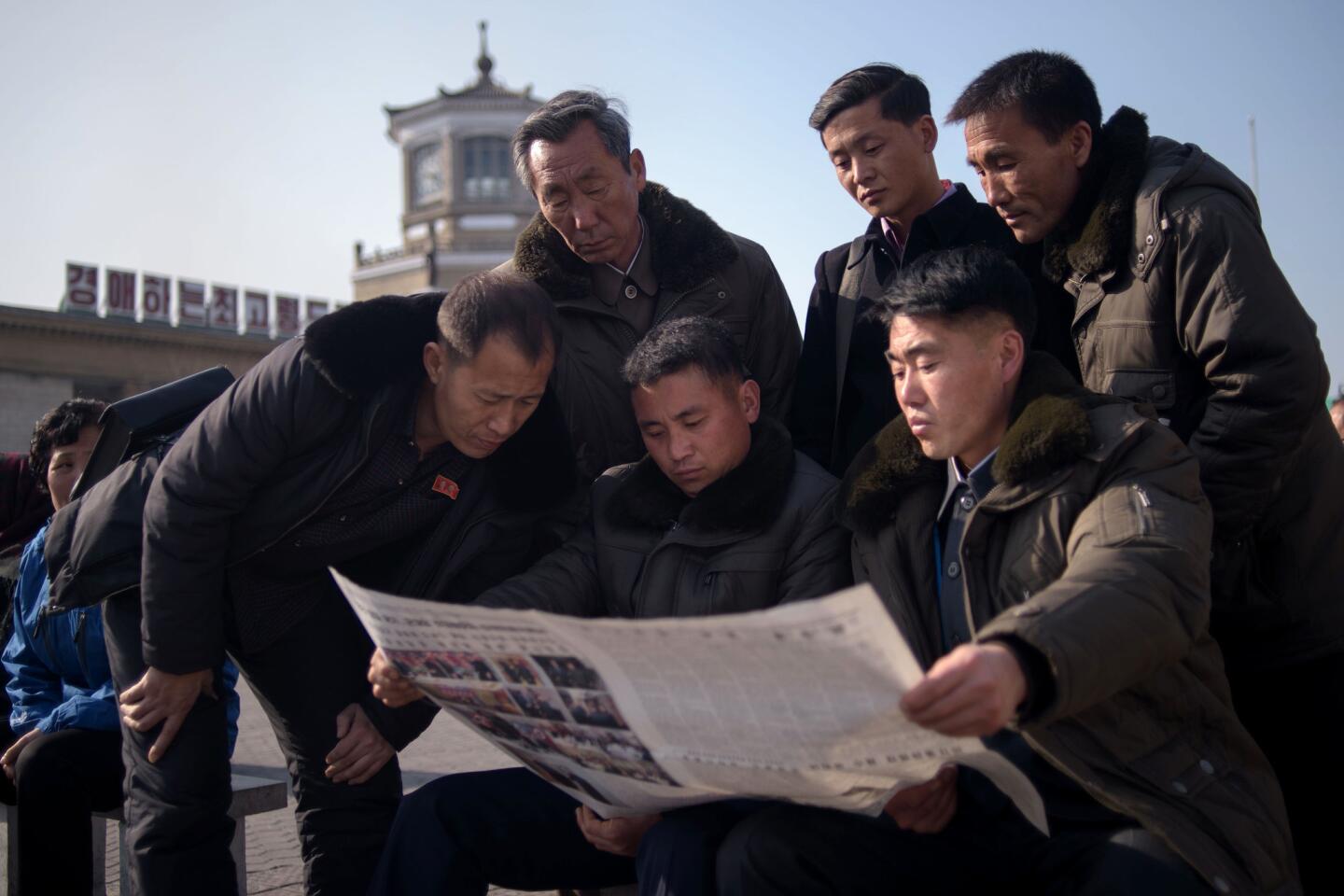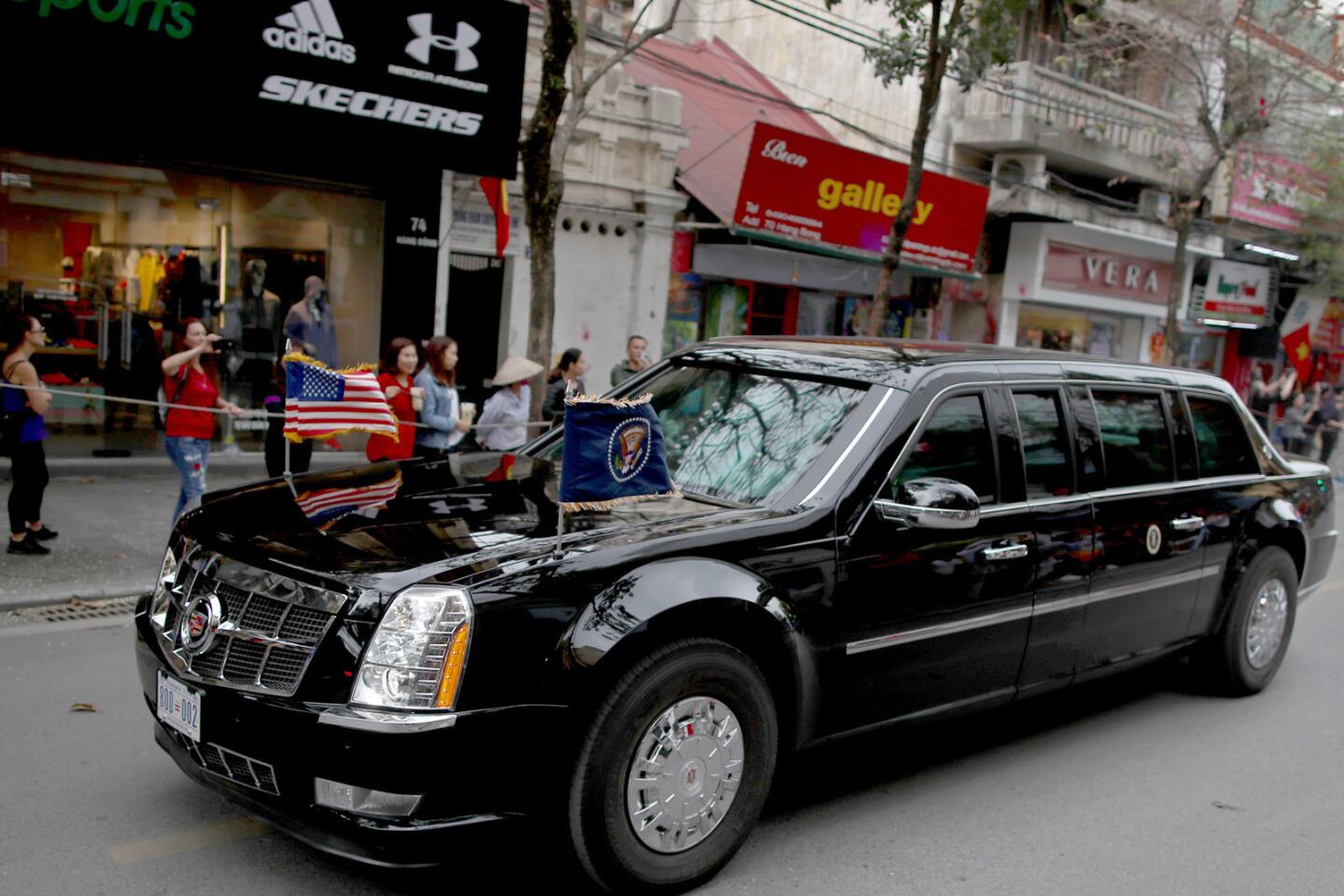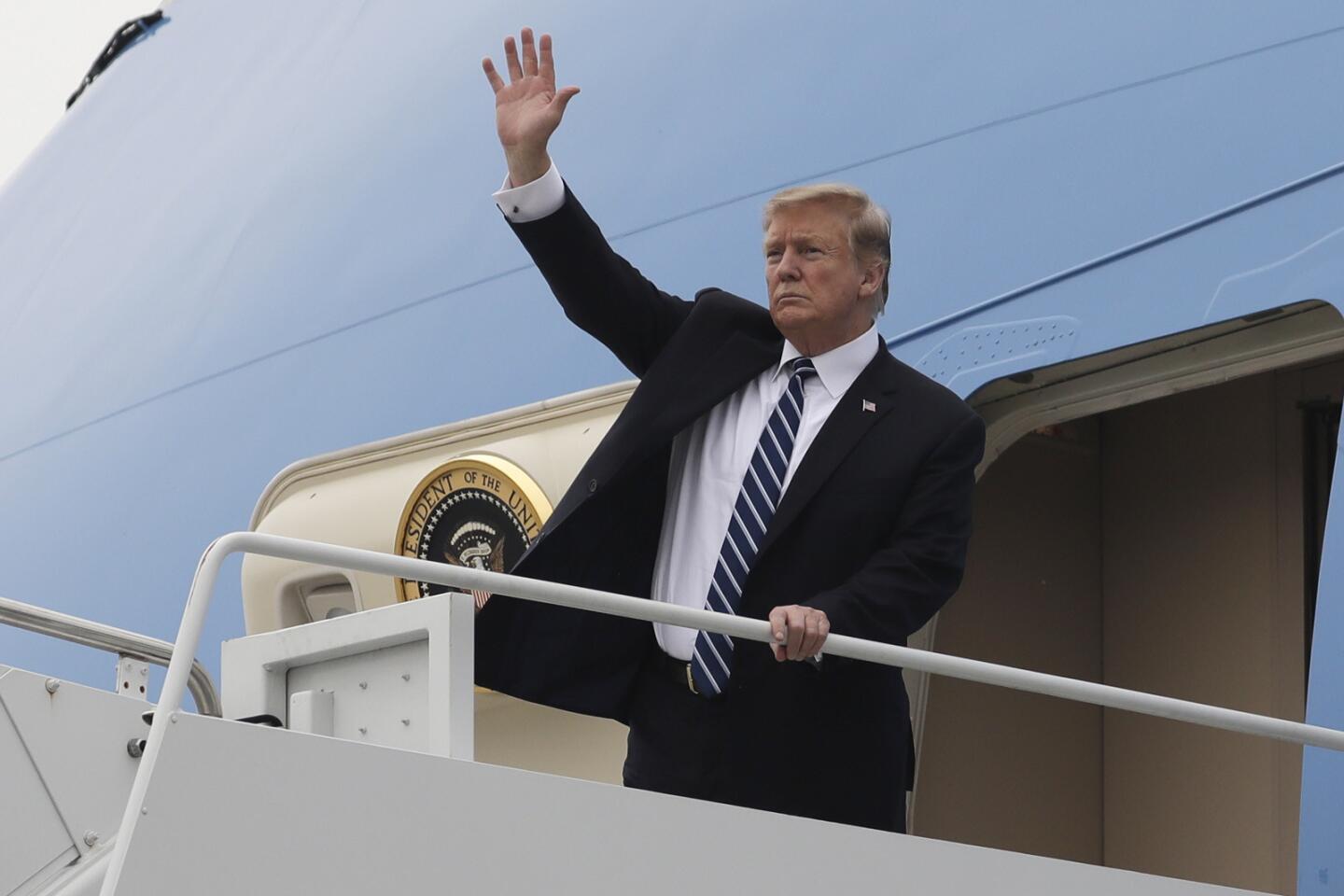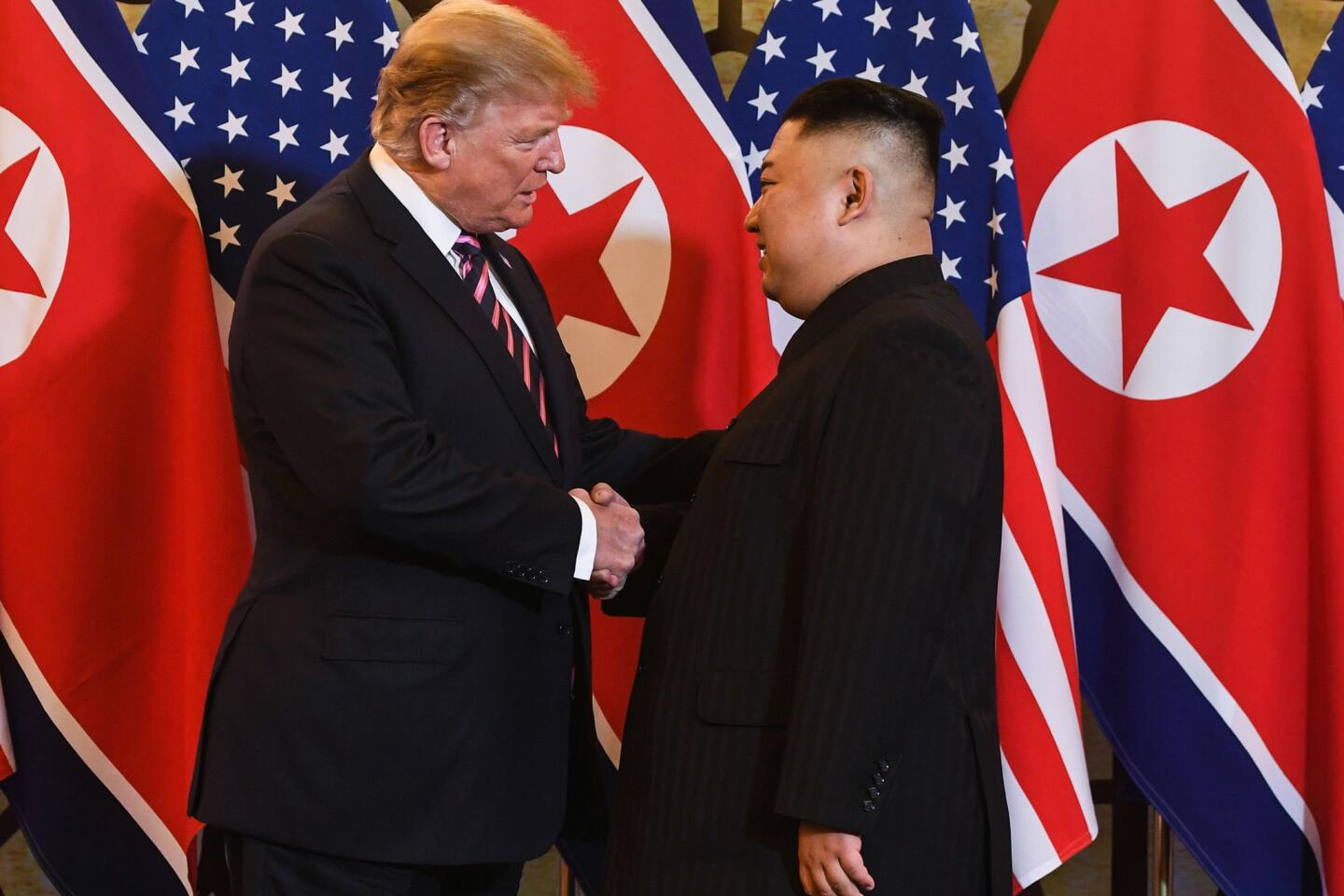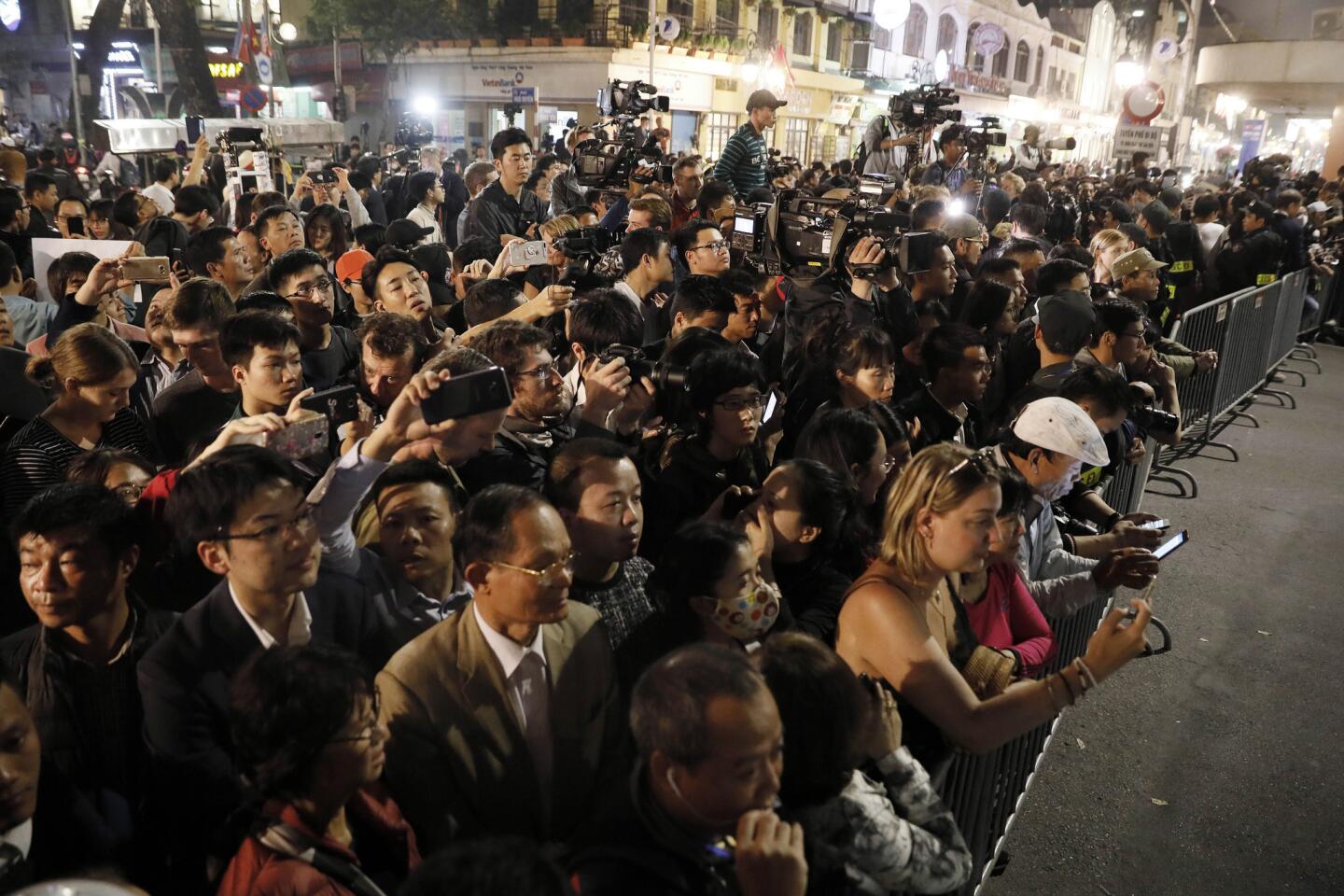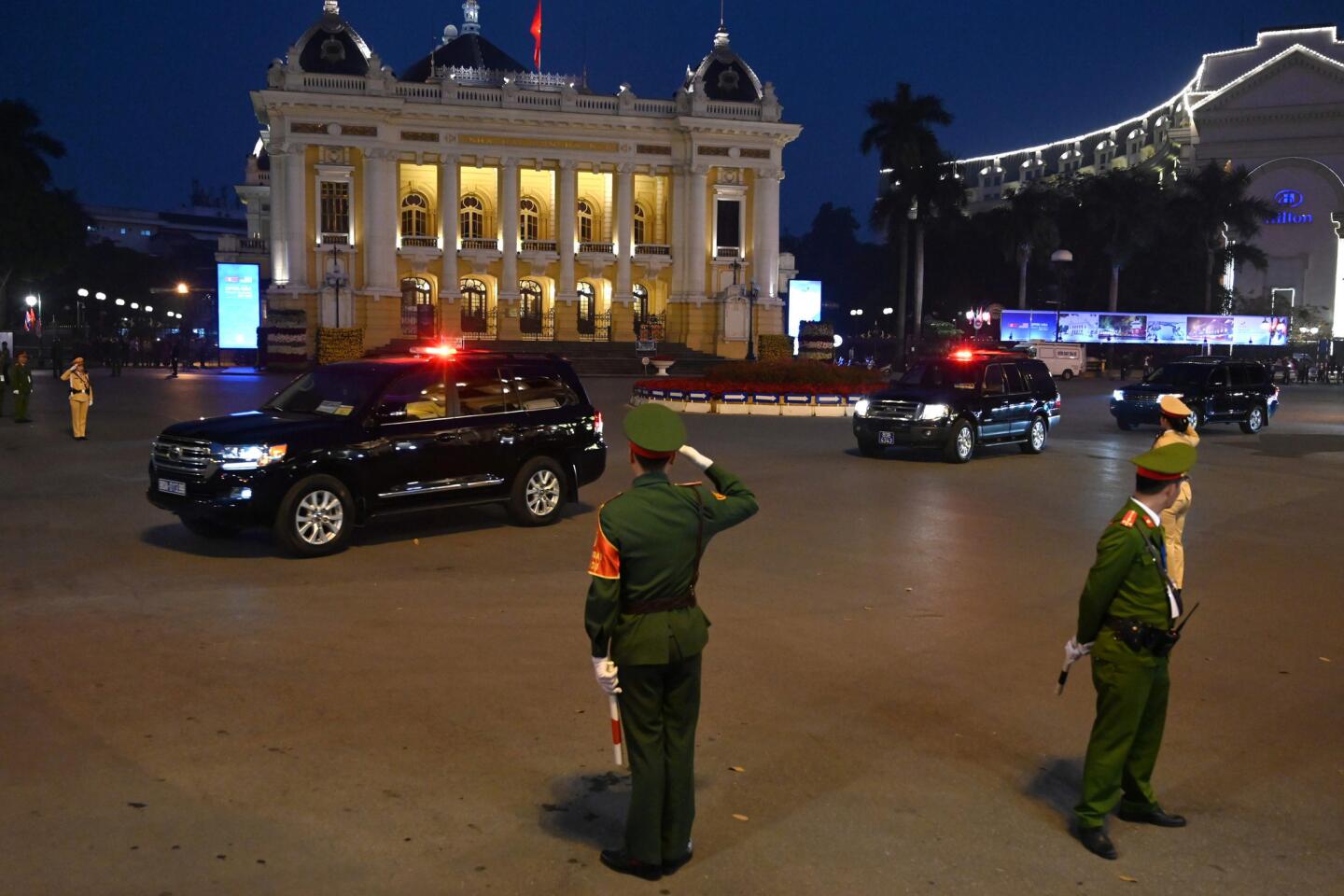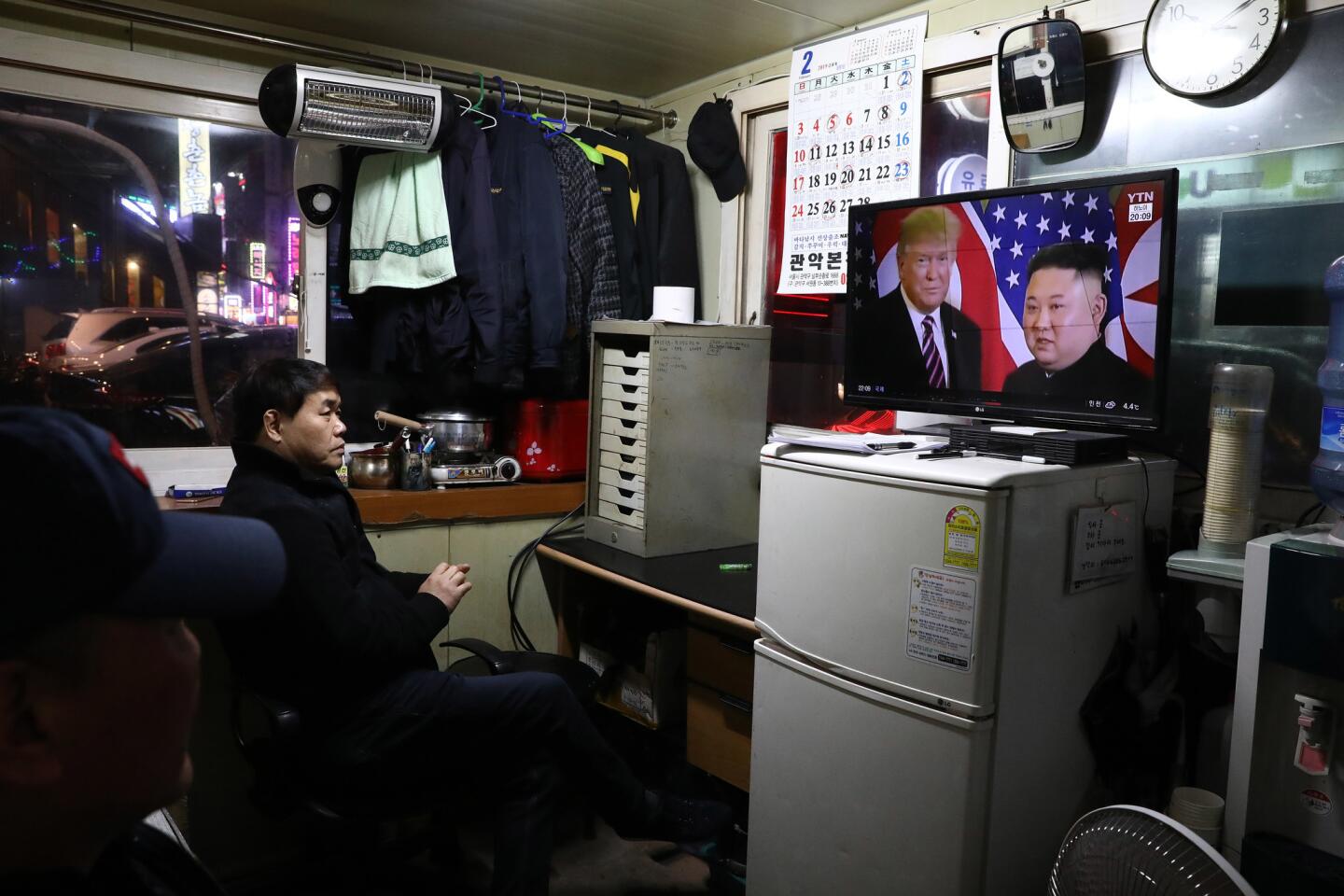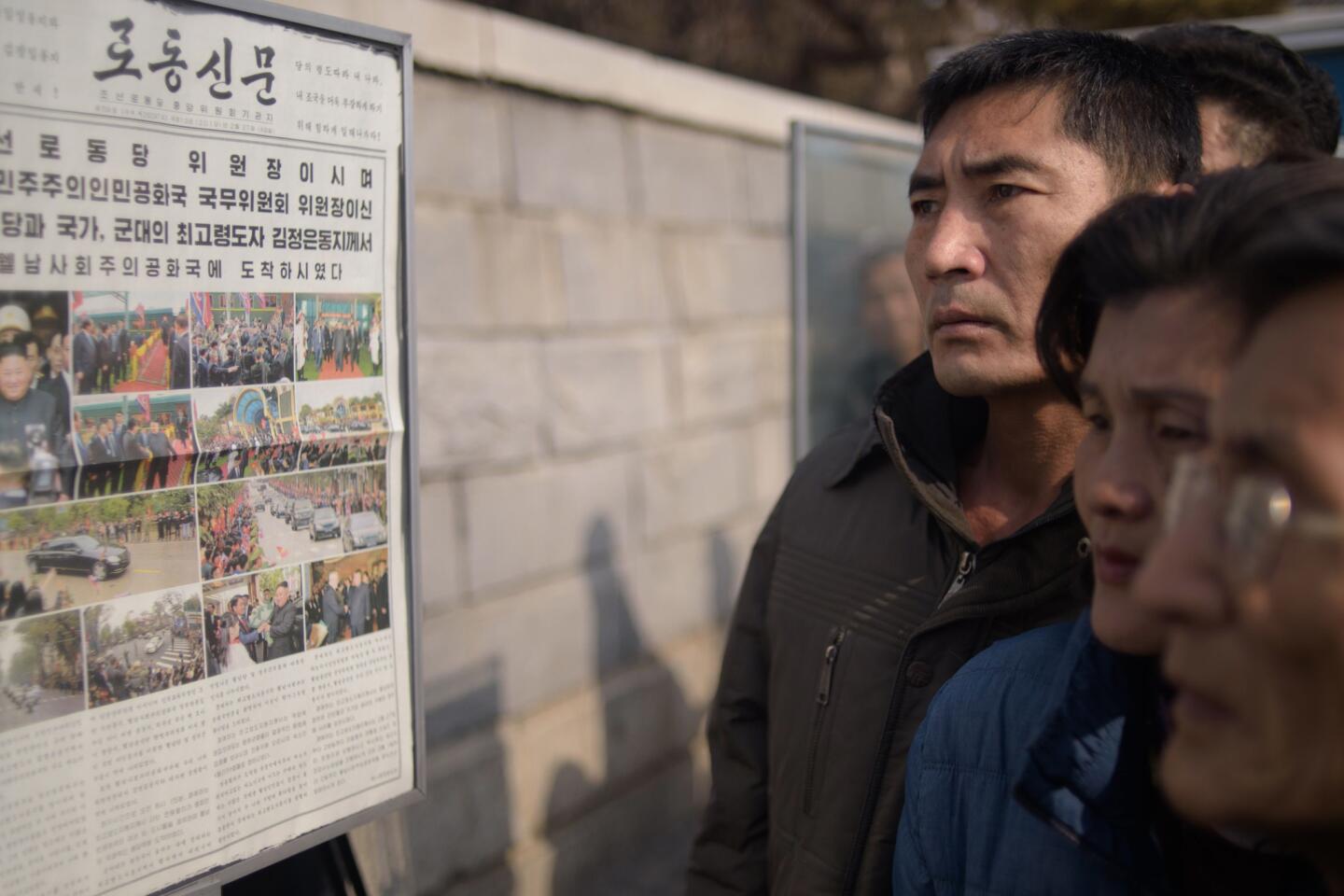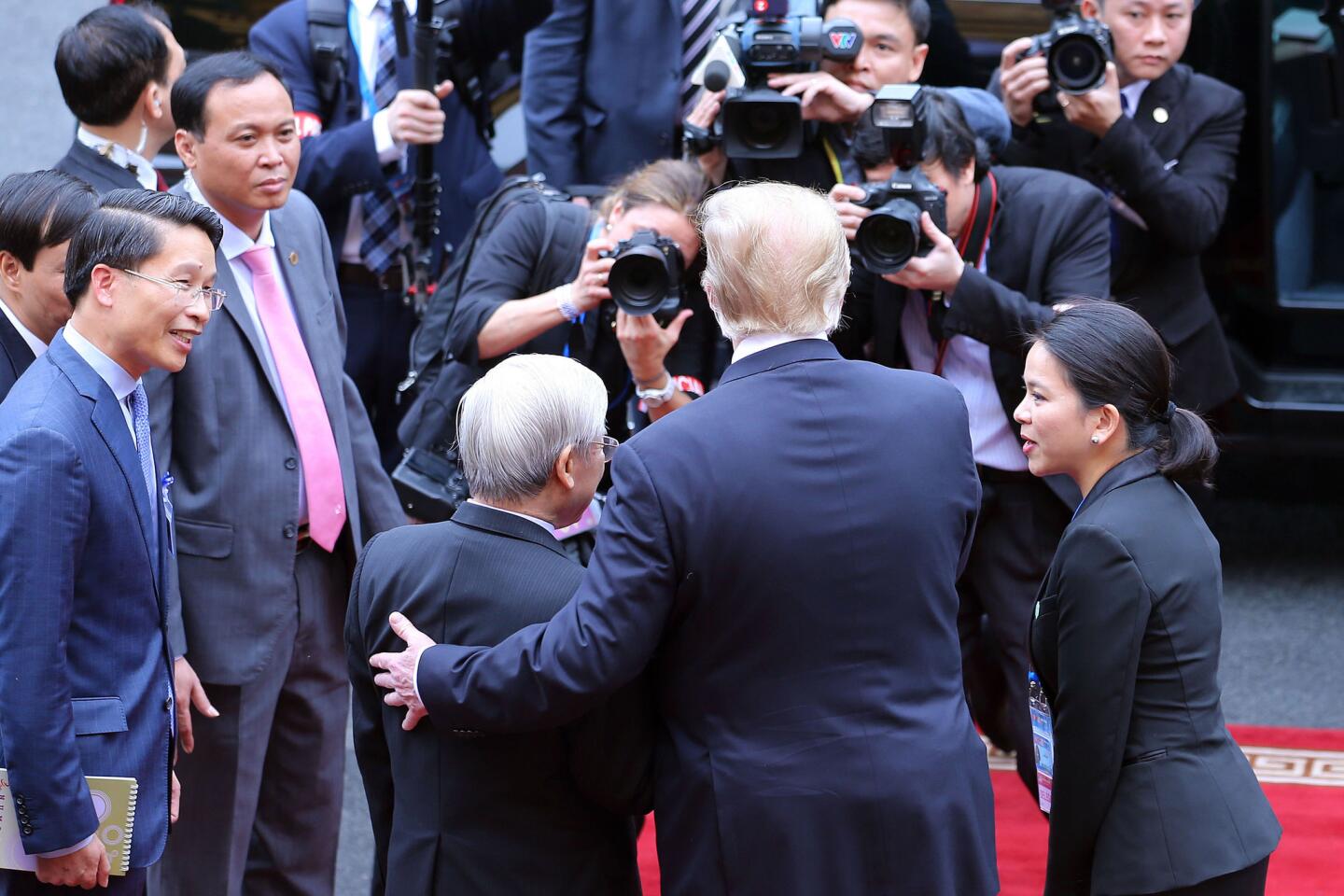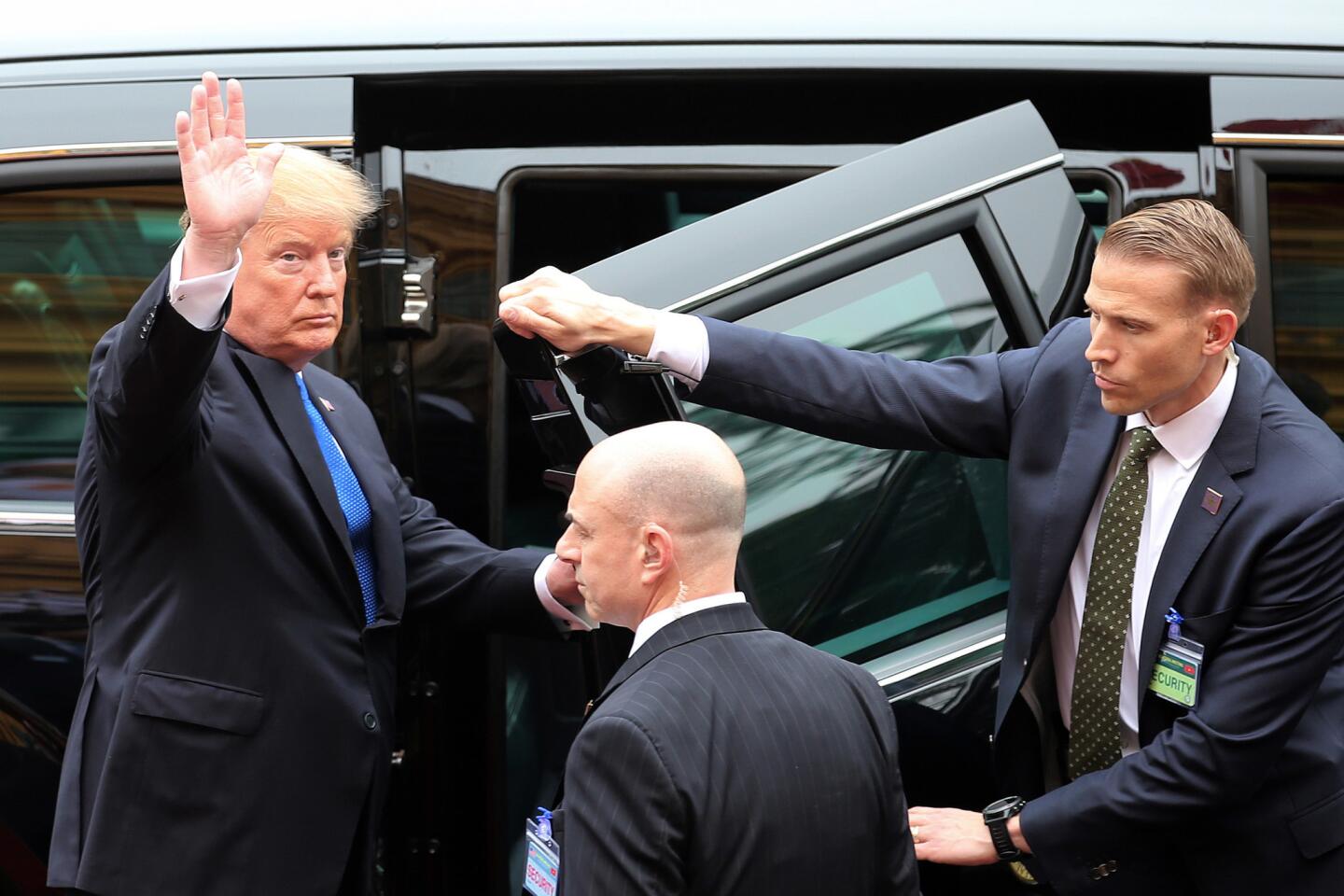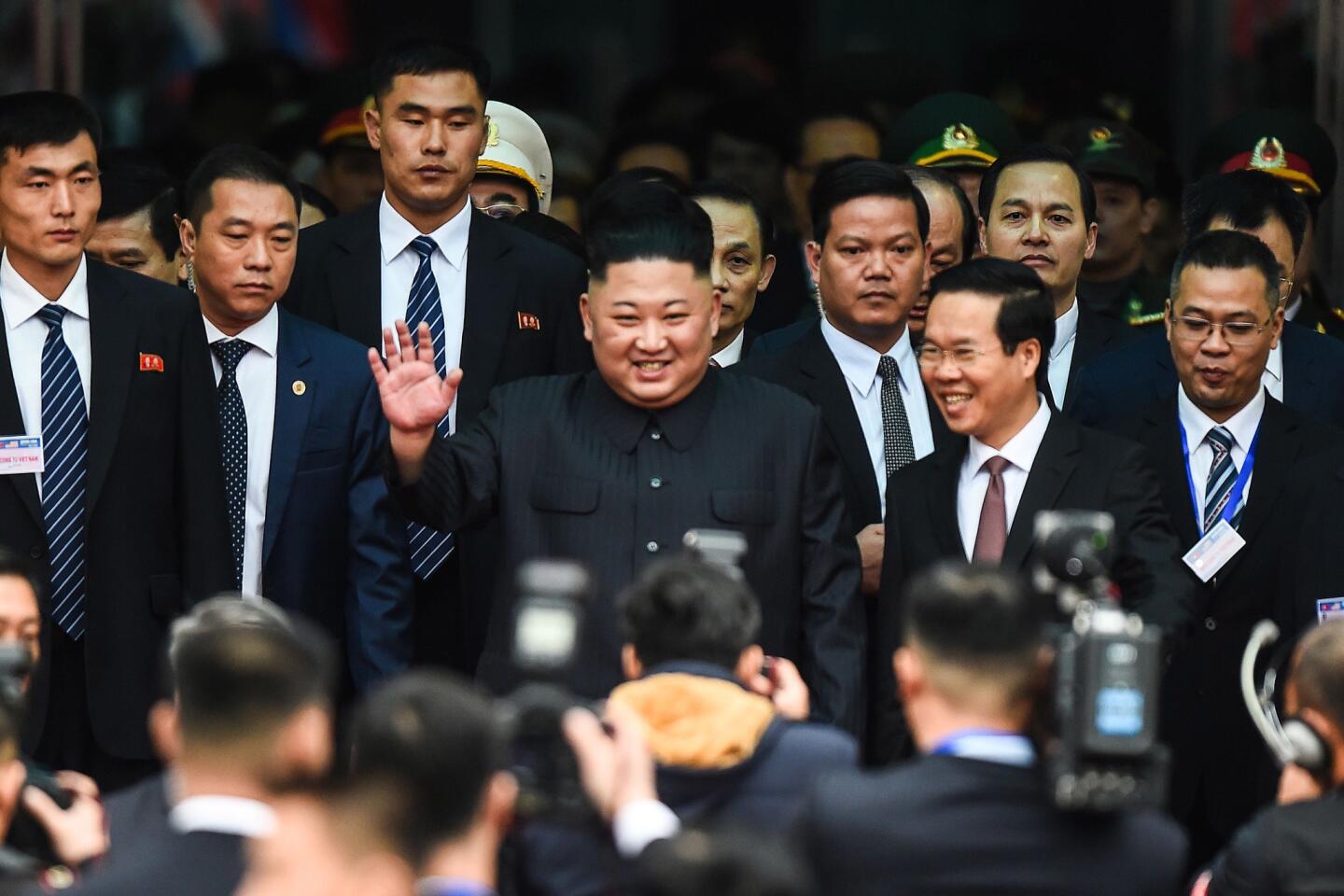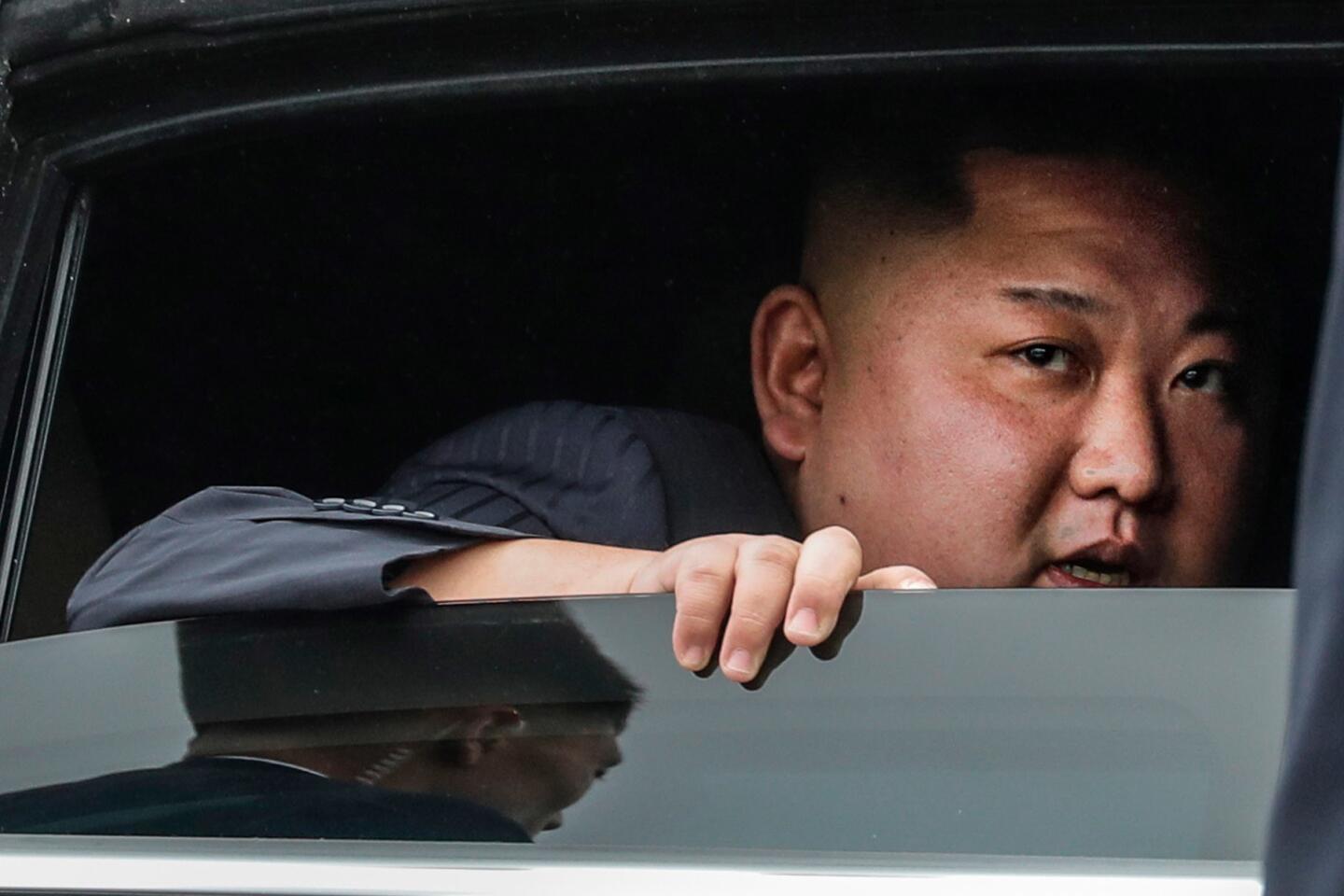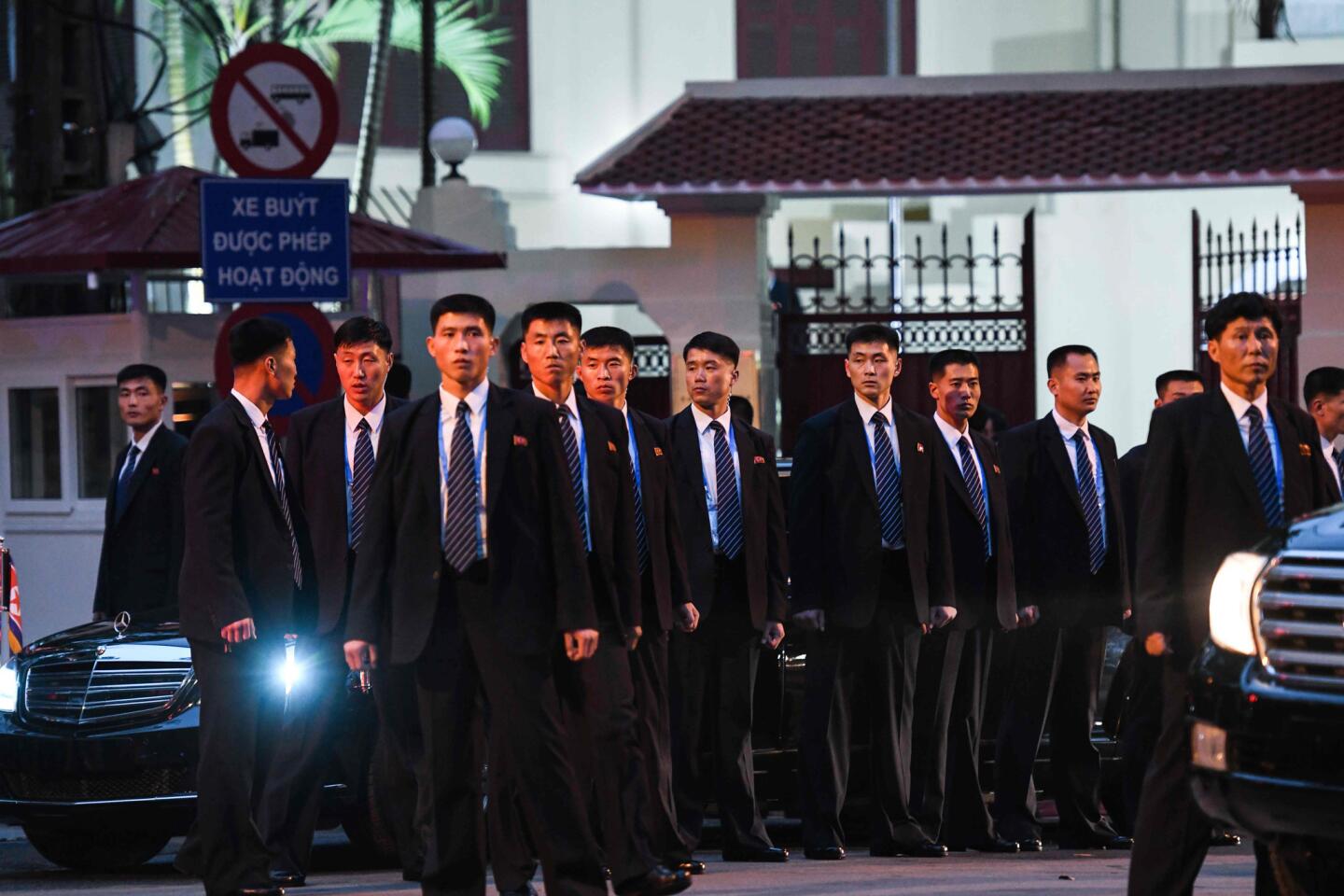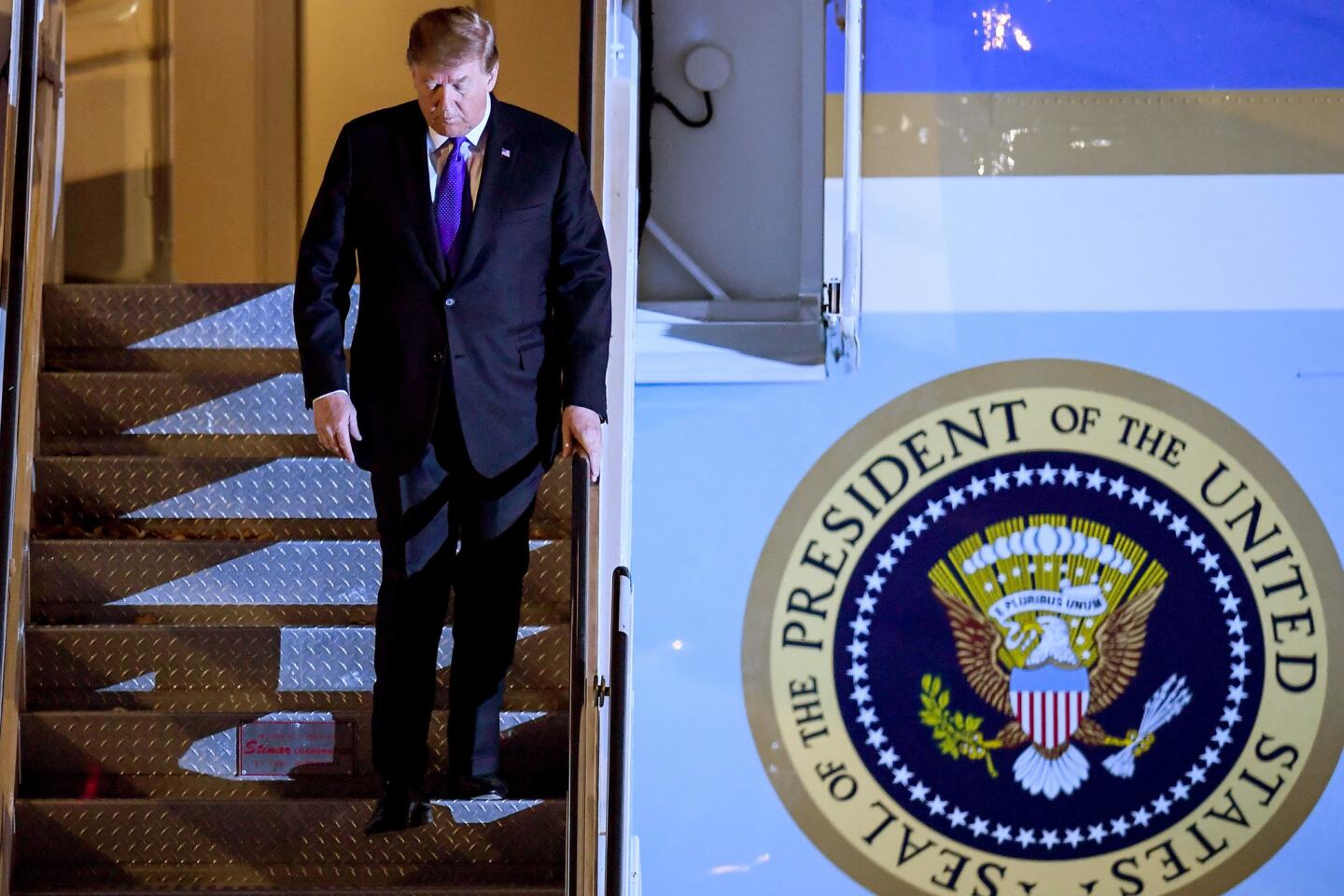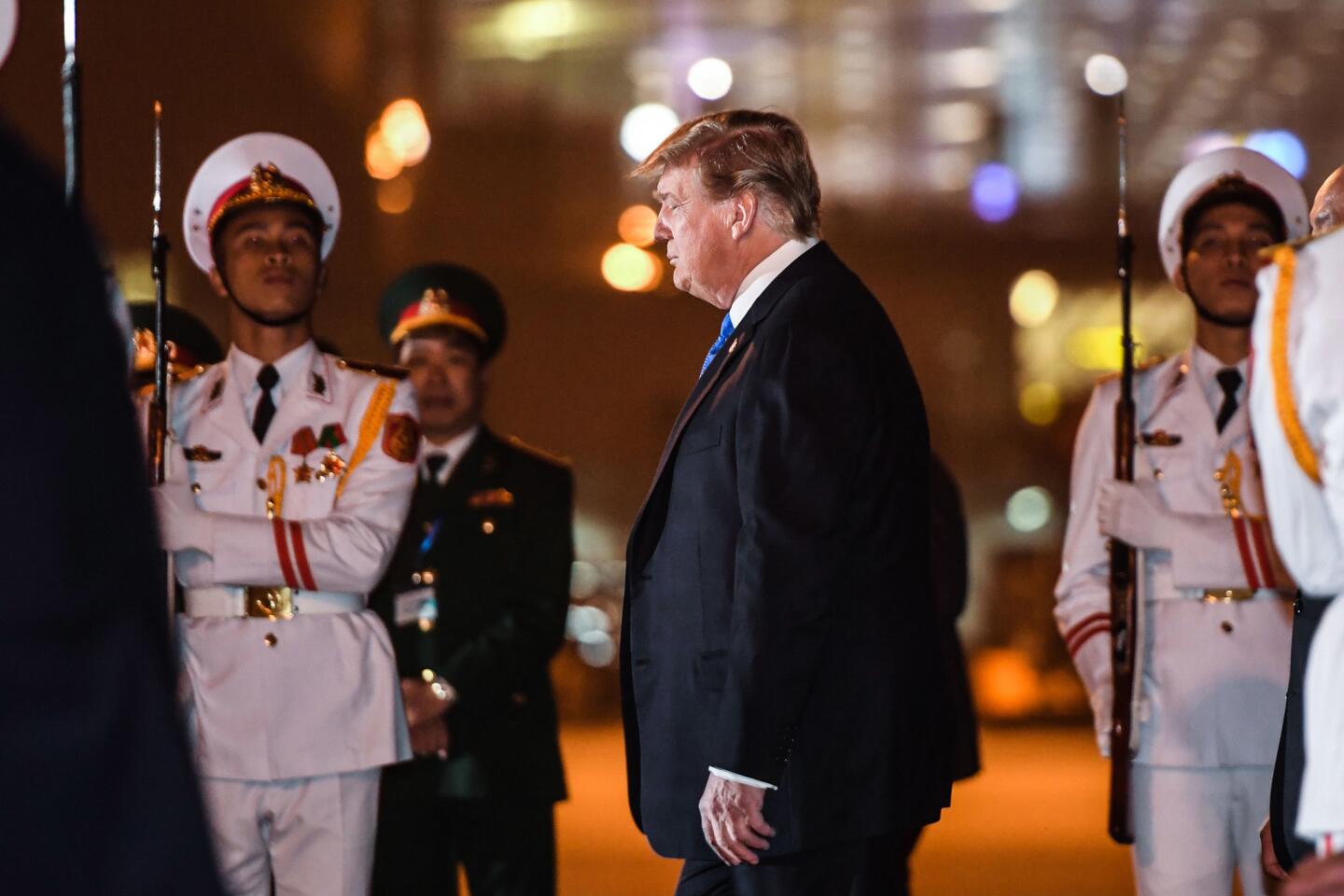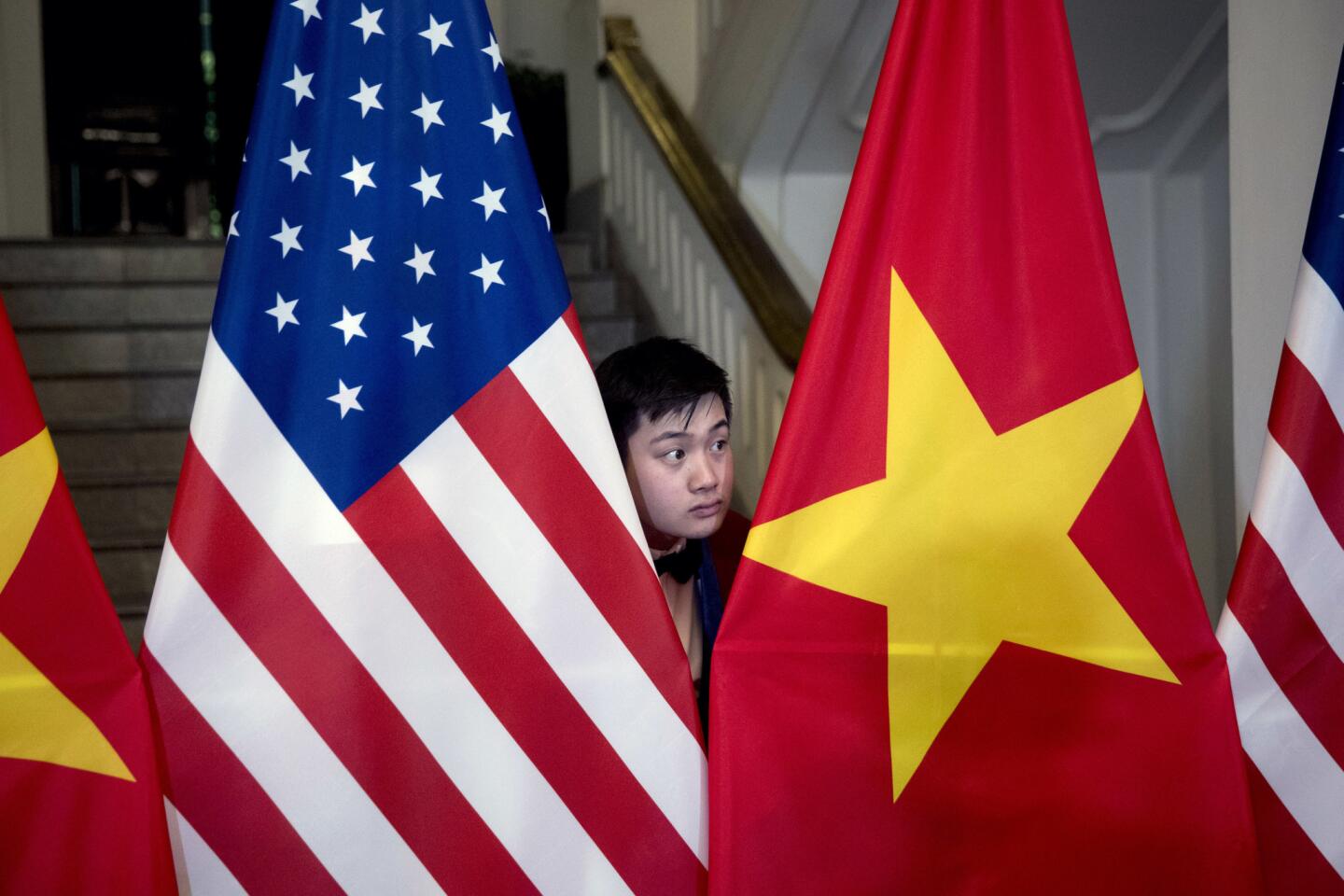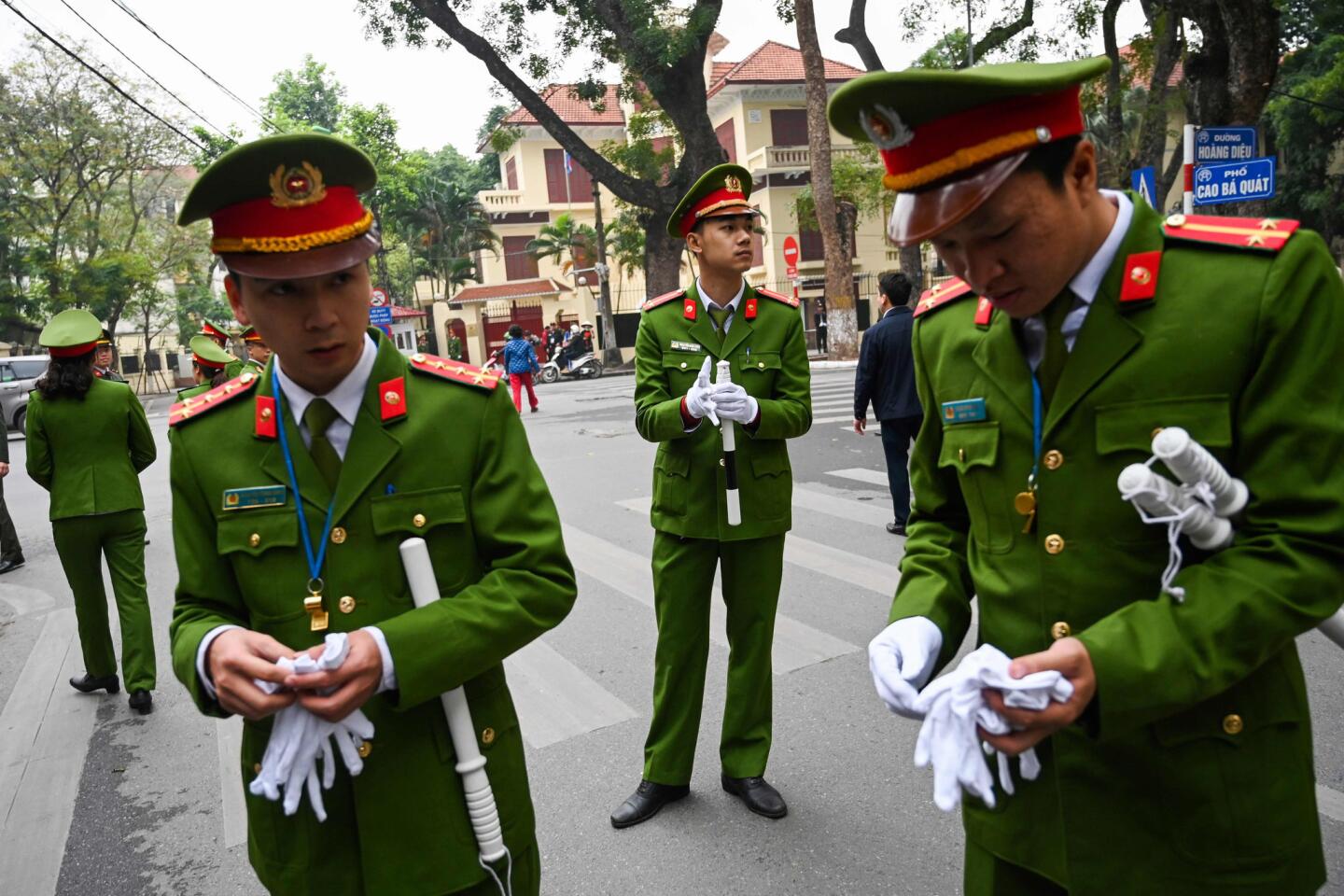Trump says he still trusts Kim, but needed to ‘walk away’ from a bad nuclear deal
- Share via
Reporting from Hanoi — The collapse of President Trump’s summit with North Korea’s Kim Jong Un left confusion in its wake Thursday, with each side blaming the other and no clear path forward in the nuclear standoff.
As Trump flew home from Hanoi, site of the abbreviated gathering, a growing outcry erupted in the United States over Trump’s defense of Kim in the 2017 death of American college student Otto Warmbier, whose family said he suffered brutal torture while imprisoned in North Korea.
But despite the president returning empty-handed, Trump’s political allies praised what they called his acumen in walking away rather than accepting a bad deal, and some analysts cited early signs that North Korea still wanted to keep open the lines of communication.
Senate Majority Leader Mitch McConnell (R-Ky.) took to the Senate floor to declare that Trump had made the right call.
“High-level diplomacy can carry high-level risks, but the president is to be commended for walking away when it became clear insufficient progress had been made on denuclearization,” McConnell said.
Trump cut short his summit with Kim earlier Thursday, rejecting the North Korean leader’s offer to dismantle a major nuclear complex in exchange for the removal of U.S.-led economic sanctions.
Trump said that the U.S. wanted more concessions from Kim and that talks would continue. But the president wouldn’t commit to holding a third summit after two high-profile meetings have failed to produce a concrete agreement on rolling back Pyongyang’s nuclear weapons program.
“Sometimes you have to walk,” Trump said at a news conference in the Vietnamese capital before departing for Washington on Air Force One. “This was one of those times.”
Less than 12 hours later, a North Korean official took the rare step of holding a news conference to tell reporters: Kim made a “realistic proposal,” and it was the U.S. that was obstinate in its demands.
In a Hanoi hotel lobby after midnight, Foreign Minister Ri Yong Ho said North Korea had proposed dismantling its main nuclear complex and permanently halting all nuclear and long-range missile testing in exchange for a partial lifting of sanctions, but the U.S. was “not ready to accept our proposal.”
“Our principal stand will remain invariable and our proposal will never be changed,” he said.
“This proposal was the biggest denuclearization measure we can take at the present stage in relation to the current level of confidence between the DPRK and the United States,” Ri said, referring to North Korea by its official name, the Democratic People’s Republic of Korea.
In response to Ri’s comments, a senior U.S. official said early Friday that while the North Korean delegation did not seek the lifting of all sanctions, it wanted to remove enough to gut the “maximum pressure” campaign of squeezing the country’s economy. The relaxation of sanctions would have freed government funds for more weapons development, according to the official, who spoke on condition of anonymity in keeping with State Department rules for speaking about negotiations.
“So to give many, many billions of dollars in sanctions relief would in effect put us in a position of subsidizing the ongoing development of weapons of mass destruction in North Korea,” the administration official told reporters traveling with Secretary of State Michael R. Pompeo. “Now, they didn’t ask us to do that, but that is effectively the choice that we were presented with. “
As Trump flew home via Alaska, where he briefly addressed troops during a refueling stop at Elmendorf Air Force Base, even some supporters expressed dismay over Trump’s about-face on Warmbier, the 22-year-old who was held for 17 months by North Korea and died shortly after being returned home in a vegetative state.
At the time, the president decried Pyongyang’s “cruel dictatorship,” and had the student’s parents, Fred and Cindy Warmbier, as guests at his 2018 State of the Union address. After the latest summit, though, Trump essentially absolved Kim of responsibility, saying the North Korean leader claimed to be unaware of any mistreatment, and “I will take him at his word.”
The backlash was swift, especially in light of Trump’s past embrace of authoritarians’ claims over those of his own intelligence services. Sen. Rob Portman, a Republican from Warmbier’s home state of Ohio, said Kim should not be let “off the hook” in the death, and House Speaker Nancy Pelosi (D-San Francisco) called Trump’s comment “strange,” citing “thugs that the president chooses to believe.”
Even without that burgeoning controversy, the summit’s collapse represented a setback for Trump, who watched his made-for-TV diplomacy eclipsed by the congressional testimony of his former lawyer, Michael Cohen, who suggested at a House hearing Wednesday that the president had violated federal laws with payoffs to conceal alleged extramarital affairs.
Asked about Cohen’s testimony at the news conference, Trump said his former confidant “lied a lot.”
“I think having a fake hearing like that and having it in the middle of this very important summit is really a terrible thing,” Trump said.
Trump indicated that Kim was willing to agree to dismantle Yongbyon, a sprawling nuclear complex that includes North Korea’s only plutonium reactor as well as facilities to produce highly enriched uranium.
But in exchange, Trump said, Kim wanted U.S. sanctions “lifted in their entirety, and we couldn’t do that.”
Ri said North Korea had only asked for a partial lifting of sanctions — five of 11 currently in place, the harshest penalties imposed after a series of nuclear tests.
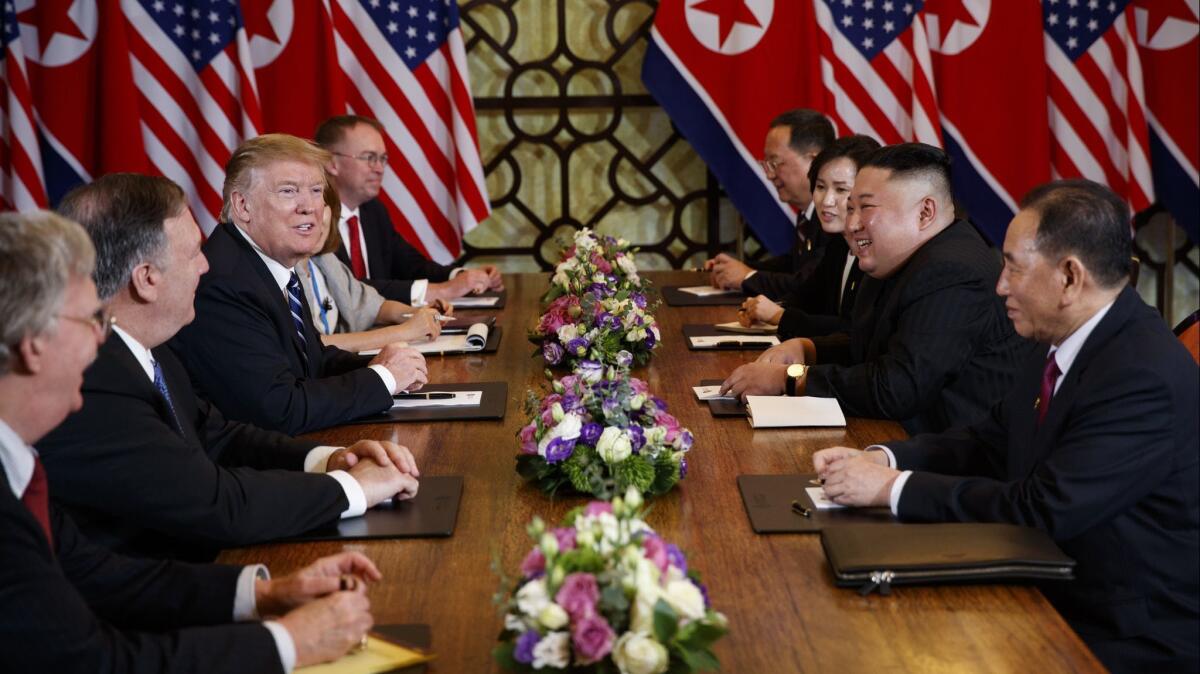
Secretary of State Michael R. Pompeo elaborated that shutting down Yongbyon still “leaves missiles, warheads and weapons systems.”
Trump said the U.S. wanted North Korea to give up secret facilities other than Yongbyon, adding: “We know every inch of that country.” Analysts relying on satellite images have said North Korea has at least one other facility to produce uranium.
When it became clear that the two sides were too far apart to reach an agreement, the White House scrapped plans for a working lunch and canceled a scheduled signing ceremony. (It had never been clear what was going to be signed.)
Trump’s motorcade departed the meetings at Hanoi’s Hotel Metropole shortly before 1:30 p.m. local time, more than an hour earlier than planned.
Trump was under pressure before the Vietnam meetings to show progress in his outreach to Kim’s enigmatic dictatorship. Last June’s summit in Singapore yielded only vague promises from Kim to denuclearize, with no definition of what that meant and no road map to reach that goal.
But this week’s meetings, which began with a dinner Wednesday, failed even to produce the mostly symbolic concessions that many observers had expected, such as an agreement to open diplomatic liaison offices — a step toward establishing normal ties — or declaring an end to the Korean War.
The summit did elevate Kim for the second time in nine months, placing him side by side with the U.S. president on the world stage — their faces painted on city walls and screened onto souvenir T-shirts, their country’s flags flying together from lampposts, the imagery of their easy interactions broadcast live around the world.
The sudden breakdown in talks Thursday came just hours after Trump and Kim demonstrated a growing chumminess and expressed optimism about making actual progress.
Asked by a reporter if he felt confident, Kim — who had never before answered questions from a reporter — said, “I wouldn’t say that I’m pessimistic.”
Later, Kim responded to another question about whether he was willing to denuclearize. “If I was not, I wouldn’t be here,” he said.
Trump, with reporters and cameras in the room, lauded Kim: “That might be the best answer you’ve ever heard,” he said.
A few hours later, after the summit’s premature conclusion, Trump made it clear that he is no longer demanding Kim’s “complete and verifiable denuclearization.”
“I don’t want to put myself in that position from the standpoint of negotiation,” Trump said at Thursday’s news conference — a remarkable departure from Pompeo’s statement last year that “the complete and verifiable and irreversible denuclearization of the Korean peninsula is the only outcome that the United States will accept.”
Trump said Kim assured him that North Korea would continue a moratorium on missile tests that has been in place since last April. That followed a provocative series of nearly 23 North Korean missile launches over 10 months, including an intercontinental ballistic missile that landed in Japanese territory.
“I trust him, and I take him at his word,” Trump said. “I hope that’s true. But in the meantime, we’ll be talking.”
Trump repeatedly emphasized his warm relationship with Kim, the head of a family dictatorship that is accused of grave human rights violations. A United Nations inquiry in 2014 found the Kim government responsible for widespread torture, deliberate starvation and other horrific rights abuses. Among other crimes, Kim is believed responsible for the execution of his uncle and the bizarre airport assassination of his half brother.
In the Warmbier case, Trump’s willingness to accept Kim’s denial was strikingly similar to his credulity with other autocrats. Last July in Helsinki, Finland, he accepted Russian President Vladimir Putin’s denial of 2016 election interference over the conclusions of U.S. intelligence officials. And in November, he again refused to accept his own government’s findings about Saudi Arabia’s crown prince having orchestrated the murder of dissident Saudi journalist Jamal Khashoggi, telling reporters that it was impossible to determine the prince’s involvement.
Shortly after taking off from Hanoi, Trump called South Korean President Moon Jae-in, who has nudged Trump along his path of engagement with Kim. A spokesman for Moon tried to strike a hopeful note, saying it was “meaningful progress” for Trump to have publicly expressed a willingness to lift sanctions in exchange for denuclearization, and that South Korea would work to keep the momentum going in U.S.-North Korea talks.
Victor Cha, Korea chair at the Center for Strategic and International Studies, a Washington think tank, said on Twitter that the summit was “an outright failure” — but said Trump “made the right decision to push for more than minimal steps and take no deal over a bad deal.”
Cha added: “Not clear where it goes from here when leaders can’t agree.”
Others said talks between the two countries seemed likely to continue at the working level, even if prospects for another Trump-Kim summit were unclear.
Jean Lee, the director of the Woodrow Wilson Center’s Korea Program, said a “face-saving interval” would probably be necessary before working-level talks could resume. The presentation of events by North Korean media in coming days, she said, will provide clues as to whether Kim’s government wanted to remain engaged in the process.
Christopher Green, a senior advisor to the International Crisis Group, said that while the summit was a setback, North Korea had probably staked out a maximum position on sanctions removal that it didn’t expect Trump to accept.
“Both parties likely concluded that it would be all right to walk away this time, looking tough for their respective domestic audiences by going home empty-handed,” Green said. “It may be frustrating for advocates of peace on the Korean peninsula, but it won’t do the two leaders any great harm.”
Times staff writers Laura King and Tracy Wilkinson in Washington contributed to this report.
More to Read
Sign up for Essential California
The most important California stories and recommendations in your inbox every morning.
You may occasionally receive promotional content from the Los Angeles Times.
